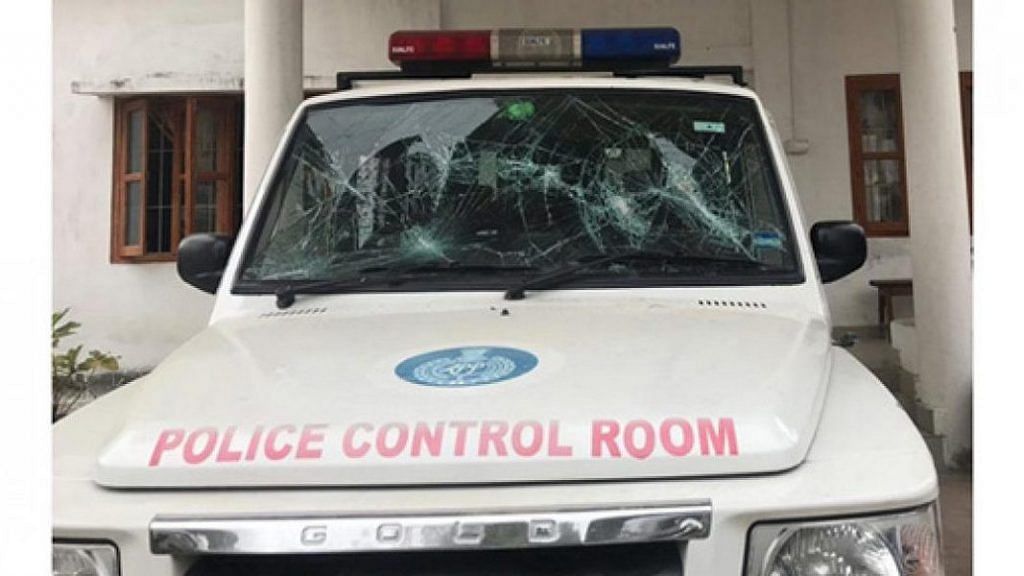Veterans and bureaucrats say Bomdila incident stems from many unresolved issues and friction between civilian administration and military.
New Delhi: The incident between Indian Army jawans and the local police administration in Bomdila in Arunachal Pradesh’s West Kameng district has turned into an ugly public fight between the military and the bureaucracy. It has just added another unpleasant chapter to a long-standing conflict between the two vital instruments of state.
Military veterans and bureaucrats ThePrint spoke to said the Bomdila incident was a tipping point that stemmed from many unresolved issues between the two.
The incident saw personnel from the Indian Army’s Arunachal Scouts regiment allegedly being beaten up by the police, to which the commanding officer (CO) responded by threatening the police.
The CO, Col. Firdosh P. Dubash, is also accused of leading about 100 troops in ransacking a police station and a PWD office, allegations that the Army has denied. Army personnel are also accused of hurling abuses and pelting stones at the district magistrate, Dr Sonal Swarup, an IAS officer.
Backlash for IAS & IPS associations
Following the incident, while the IAS association wrote to the Defence Ministry to take action against those involved in the alleged vandalism, the IPS association took to social media to criticise the CO’s actions. It also embedded the video of his threats to the police.
An @adgpi CO openly threatening civil authorities in #Bomdila deserves condemnation. Unlike him, Civil Authorities acted with maturity and lived up to the Sardar's advice, "A policeman who loses his cool ceases to be a police officer".#DemandCorrectiveAction #ArmyNotAboveLaw pic.twitter.com/f5PcxnUI6v
— IPS Association (@IPS_Association) November 8, 2018
The associations’ responses, however, met with a barrage of criticism for “jumping the gun”, and praise for Col. Dubash for acting like a true leader as per the ‘Chetwode Motto’, which states: “The honour, welfare and comfort of the men you command comes next. Your own ease, comfort and safety comes last.”
Also read: Defence ministry says both police and Indian Army jawans to blame for bust-up at Bomdila
Pent-up emotions in armed forces
While sources say the Defence Ministry is examining how the brawl escalated into a war between institutions, former army chief General Ved Prakash Malik told ThePrint that it is the result of mistrust that has developed between them because of the way the ministry itself has functioned.
“There are pent-up emotions among the armed forces against the civilian administration, primarily because of the way they have handled pay and allowances for the armed forces, issues of disability pension, warrant of precedence, among other issues,” Gen. Malik said, adding that these grievances contribute to the blame-game and flare-ups between the two.
Malik said such incidents are unheard of in forward posts, where both usually share good relations.
“I was surprised. Why were the jawans picked up and put behind bars, instead of being handed over to the commanding officer?” he said.
“While I accept that what apparently happened after that was wrong, I would have done the same as what the commanding officer did. The IAS and IPS associations have no business to get involved in this.”
Another army officer, on the condition of anonymity, agreed that the Bomdila incident had made simmering tensions boil over. The officer said over the last decade or so, especially after the implementation of the 6th Central Pay Commission, the issue of non-functional upgradation or NFU has disturbed the already precarious equation drastically.
NFU was granted to civilian officers with the implementation of the 6th Central Pay Commission in 2006, which meant that they would get the salary of the next post even if they did not get promotions due to lack of vacancies. This has not been applied to the armed forces, who have taken the matter to the Supreme Court.
“The armed forces feel that they are always given the short shrift. Hence, the reactions tend to be violent,” the officer said.
Major Priyadarshi Chowdhury (retd) felt that there could be many such instances in future if the Defence Ministry did not take corrective action.
“The rift is dangerous as it directly affects the morale of the forces. As far as the IAS and IPS associations are concerned, they need some education on handling such situations,” Chowdhury said.
Also read: Defence ministry spokesperson who criticised military on Twitter sent on leave
Bureaucrats’ view
A senior bureaucrat who has served in Jammu and Kashmir said differences between the civilian administration and the military are not new, and were reported in the 1990s too.
“However, a crucial factor that flared-up the Bomdila incident is social media. The letters of the IAS association and the comments of the IPS association were splashed across social media and there were reactions and counter-reactions to them. The matter had to flare up,” the official told ThePrint.
Another damaging factor, said the official, was the excessive use of armed forces for handling internal security operations, which was bound to lead to conflict because of friction between the police and the army, who do not share information with each other.
Meanwhile, an IAS officer from the West Bengal cadre said it was the duty of the IAS association to bring this particular matter to attention.
“It is wrong to ask why the association jumped to the fore on the issue and wrote to the MoD. If an IAS officer was assaulted, even by the armed forces, the association is bound to condemn it and seek justice,” the bureaucrat said.
